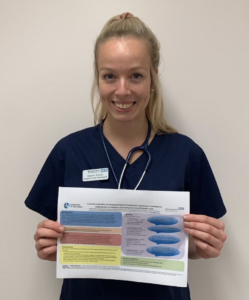Blog written by: @HeathRim Heather Rimmer, Surgical Nurse Practitioner, Worcestershire Royal Hospital, hrimmer@nhs.net, MSc ACP Student, University of Worcester
2020, the International Year of the Nurse, really has been a year like no other. Ironically, thanks to the novel corona virus (Covid-19), which has been responsible for 1.08 million deaths to date (Shuman et al, 2020; World-o-meters, 2020), nurses globally, have been asked to put down their party poppers and don their facemasks to help firefight during the pandemic.
This international emergency has substantially burdened intensive care units worldwide; and as a result, the exponential increase in demand for ICU trained nurses has meant that many healthcare professionals, including Advanced Clinical Practitioners (ACPs), faced emergency redeployment from their usual roles, thus provoking a huge amount of anxiety and work-related stress (Kang et al, 2020; DePeralta et al, 2020).
In early March, staff, including myself, (an ACP specialising in General Surgery) were examined for the ability to be redeployed to areas of critical need; predominantly intensive care units (Proulx, 2020). During the first week of redeplo yment, it became starkly apparent that not all redeployed ACPs had previous intensive care experience therefore they were potentially working in unfamiliar ways and having to adapt to new changes daily (Fino et al, 2020; Cartwright & Thompson, 2020).
yment, it became starkly apparent that not all redeployed ACPs had previous intensive care experience therefore they were potentially working in unfamiliar ways and having to adapt to new changes daily (Fino et al, 2020; Cartwright & Thompson, 2020).
My personal redeployment to intensive care prompted a decision to focus my Masters dissertation on the topic of redeployed ACPs experiences of Covid-19 and their move to nursing in intensive care units. Luckily for me, I had previous ITU experience; albeit only for 2 years and in the earlier part of my career. Even with this capability, I felt apprehensive about the transition and was constantly wondering how other ACPs were coping with the change. With the help of my dissertation supervisor, we designed an anonymous service evaluation via an online survey platform, which asked open ended questions to redeployed ACPs at my hospital trust.
There were mixed experiences of redeployment and experience level was critical to the overall outcome for most participants and impacted on their perceived level of competence. Generally, more experienced ACPs found the transition easier as they were better equipped to deal with change management and working in different teams and these ACPs felt more competent overall. Some participants welcomed the idea of compulsory rotation for nursing staff to intensive care and suggested that if they had had previous intensive care skills; they would have felt more competent in clinical practice.
The ACPs with a stronger support network were found to have a more positive experience of management strategies and department leads. This was an important key finding. Social interaction is a leading theme in many transition narratives and transitions usually are enabled more harmoniously when the participant experiences a strong level of social interaction and support (Meleis et al, 2010).
The findings of this evaluation (Rimmer & Gaskin, 2020) were chosen for dissemination at the National Health Education England (HEE) ACP virtual conference in November 2020 and a poster was created to present the evaluation findings. I am proud to say that my project was shortlisted in the top 10 chosen by the judging panel and subsequently won the poster competition. This was such a highlight of the year personally and has made the hard work worth it. I hope the results of my service evaluation can be extrapolated for further research into pandemic planning; with a focus on effective management of redeployed ACPs.
See poster by clicking on this link: https://app.luminpdf.com/viewer/5fe8c0b3c2335200187d8a4d
References:
Cartwright, J. and Thompson, A. (2020) ‘Introducing psychological strategies for healthcare professionals during Covid-19: an overview of the face Covid intervention’, Dermatological Nursing, 19 (2), pp. 18-21.
DePeralta, D., Hong, A., Choy, C., Wang, J., Ricci, J., Marcano-Benfante, B. and Lipskar, A. (2020) ‘Primer for intensive care unit (ICU) redeployment of the noncritical care surgeon: Insights from the epi-centre of the coronavirus disease 2019 (Covid-19) pandemic’, Surgery, pp. 1-3.
Fino, E., Fino, V., Mazzetti, M. and Russo, P. (2020) ‘Tending and mending: Affiliative responses to the Covid-19 pandemic by healthcare professionals in Italy’, Psychological Trauma: Theory, Research, Practice and Policy, 12 (1), pp. 171-173.
Kang, L., Li, Y., Hu, S., Chen, M., Yang, C., Yang, B., Wang, Y., Hu, J., Lai, J., Ma, X., Chen, J., Guan, L., Wang, G., Ma, H. and Liu, Z. (2020) ‘The mental health of medical workers in Wuhan, China dealing with the 2019 novel coronavirus’, The Lancet, 7, pp. 14.
Meleis, A. (2010) Transitions Theory: Middle range and situation specific theories in Nursing Research and Practice. New York: Springer Publishing Company.
Proulx, B. (2020) ‘Covid-19 Care Model: Leveraging Advanced Practice Providers’, Nursing Economics, 38 (3), pp. 149-151.
Rimmer, Heather and Gaskin, Kerry (2020) A service evaluation of Advanced Clinical Practitioners’ experiences of emergency redeployment to intensive care during the Covid-19 health crisis. In: Advanced Clinical Practice Conference, 9-12 November 2020, Online.
Shuman, C. and Costa, D. (2020) ‘Stepping in, stepping up, and stepping out: competencies for intensive care unit nursing leaders during disasters, emergencies and outbreaks’, American Journal of Critical Care, 29 (5), pp. 403-406.
World O Meter (2020) Covid-19 Coronavirus Pandemic. Available at: https://www.worldometers.info/coronavirus/(Accessed 17th September 2020).